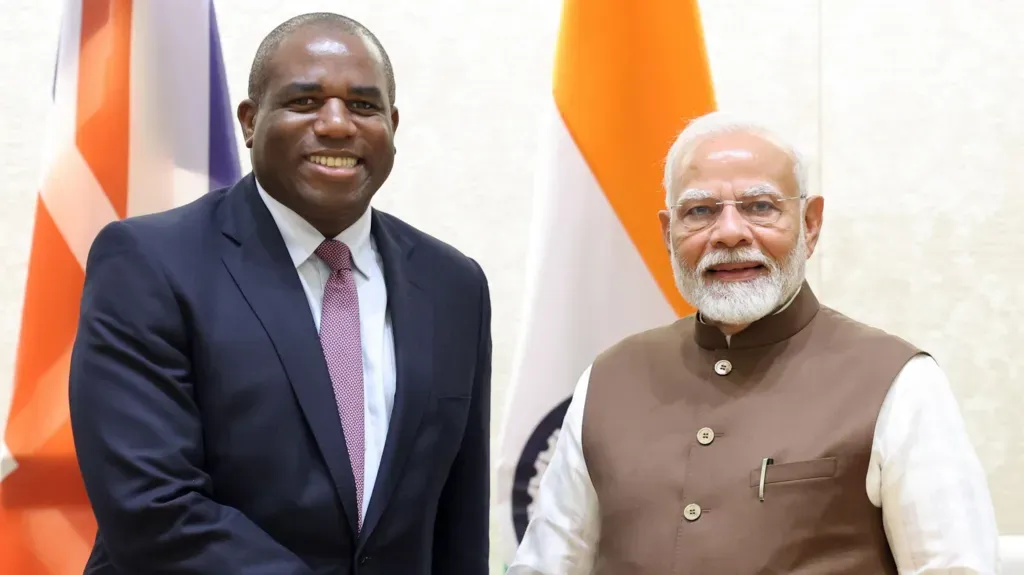In a carefully orchestrated diplomatic maneuver, UK Foreign Secretary David Lammy embarked on a highly anticipated visit to India. This journey, which began in the sweltering heat of New Delhi, was far more than a mere formality. It marked a significant effort by the new Labour government to reshape and revitalize the relationship between the United Kingdom and one of the world’s emerging superpowers.
The Context: Historical Tensions and New Beginnings
Historical Background
India’s relationship with Britain has been marked by historical complexities and political challenges. From the controversial decisions of Clement Attlee’s government during the partition of India to the contentious interventions of Foreign Secretary Robin Cook over the Kashmir conflict, the historical baggage has often overshadowed diplomatic efforts. More recently, the Labour party’s past motions advocating international intervention in Kashmir have further strained relations.
The Present Diplomatic Landscape
David Lammy’s visit comes at a crucial time. With India poised to become the world’s third-largest economy by the end of the decade, the UK recognizes the necessity of strengthening its economic and geopolitical ties with the subcontinent. This visit was not just about maintaining a diplomatic formality but was seen as a strategic move to recalibrate relations and capitalize on the growing economic potential of India.
The Visit: A Diplomatic Tightrope
Arrival and Initial Impressions
Upon arriving in New Delhi, Lammy was greeted by the intense heat and humidity that characterize the Indian summer. His arrival was a stark contrast to the more familiar European and American diplomatic circles he had navigated previously. The visit was meticulously planned to avoid controversy and focus on constructive dialogue.
Key Meetings and Discussions
Engagements with Indian Leaders
Lammy’s schedule was packed with high-profile meetings. He held discussions with Indian Foreign Minister Subrahmanyam Jaishankar and secured a rare audience with Prime Minister Narendra Modi. This meeting was particularly significant given Modi’s tendency to limit his interactions to heads of state rather than foreign ministers.
The talks between Lammy and Modi were framed by the backdrop of the Indian government’s recent budgetary policies and ongoing geopolitical dynamics. The discussions were expected to cover a range of issues, from trade agreements to collaborative ventures in green technology and security.
Strategic Discussions on Trade and Technology
A cornerstone of Lammy’s visit was the focus on economic collaboration. The UK’s goal was clear: to enhance trade relations with India, which is currently the UK’s 12th largest trading partner. The British delegation emphasized the mutual benefits of a robust economic partnership, highlighting the potential for increased British business opportunities in the Indian market.
One of the notable outcomes was the agreement on a new tech security partnership, reflecting both countries’ commitment to advancing in the technology sector while ensuring robust security measures.
Geopolitical Implications
A Shift in Focus: The Global South
Lammy’s visit was not just about trade. It was also a strategic move to reset Britain’s relations with the Global South, a group of developing nations where India plays a pivotal role. The approach marked a departure from the traditional British stance of lecturing and instead embraced a more collaborative and listening-oriented dialogue.
The China Factor
Another critical aspect of the visit was the discussion on shared threats in the Indo-Pacific region, particularly concerning China. Both nations recognized the importance of addressing common security challenges and exploring opportunities for collaboration in this strategically significant region.
Navigating Controversies and Challenges
The Russia Oil Issue
Despite the positive tone of the visit, Lammy had to navigate delicate issues, such as India’s continued purchase of Russian oil. While this matter was acknowledged, it was handled with diplomatic finesse to avoid souring the discussions.
The Labour Legacy
Lammy’s trip also aimed to address the residual concerns stemming from the previous Labour leadership. The visit was a chance for Labour to demonstrate its commitment to a balanced and forward-looking foreign policy, distancing itself from past controversies.
The Aftermath: Reactions and Reflections
Immediate Outcomes
Following the visit, both nations expressed a shared commitment to deepening their bilateral relationship. The signing of new agreements and the initiation of trade talks were seen as tangible outcomes of Lammy’s diplomatic efforts. The early visit by Lammy, along with his delegation of tech entrepreneurs, was viewed positively by Indian officials and business leaders.
Long-Term Implications
The trip has set the stage for a renewed partnership between the UK and India. It represents a strategic realignment that could have far-reaching implications for both countries’ economic and geopolitical positions. For the UK, it is an opportunity to strengthen its presence in an increasingly influential region, while India benefits from enhanced trade relations and technological collaboration.
Conclusion
David Lammy’s visit to India was more than a diplomatic formality; it was a significant step in recalibrating the UK-India relationship. By focusing on constructive dialogue, economic collaboration, and strategic interests, Lammy has laid the groundwork for a new chapter in the bilateral relationship. As both nations move forward, the fruits of this visit will likely become more evident, marking a new era in UK-India relations characterized by mutual respect and shared goals.


